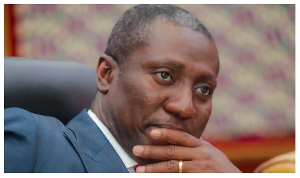Accra, Nov. 2, GNA - Mr. Yaw Barimah, Minister of Employment and Manpower Development, on Tuesday underscored vigorous development and retention of a skilled workforce to participate fully in the global economy and to reap the benefits of globalisation.
He said: "African countries can realise the prosperity associated with globalisation and the global economy if their citizens understand the rules and principles, and this can be done if we have a strong and reliable skilled workforce."
"It should not only be a question of developing a skilled workforce base, but we should also be able to retain them for the benefit of our countries," he said.
Mr Barimah was addressing the opening session of a five-day regional trades union conference on the New Partnership of Africa's Development (NEPAD) and Poverty Reduction Strategy Papers (PRSP) in Accra. He said qualitative human capital in terms of skills and knowledge to gain access to the world market was the surest way out of poverty.
Twenty trades union leaders from nine African countries are attending the conference to sensitise participants on the NEPAD/PRSP project by the International Conference on Free Trade Union African Regional Organisation (ICTFU-AFRO).
The project, which receives financial assistance from the Federation G=E9n=E9rale des Travailleurs Belgique (FGTB), is operational in Ghana, Kenya, Malawi, Benin, Democratic Republic of Congo, Zambia, Senegal, Rwanda and Mozambique.
These countries involved in NEPAD and PRSP are concerned with the initiative to alleviate debt among the Heavily Indebted Poor Countries (HIPC) initiative under the aegis of the international financial institutions.
They are also involved in promoting civil society participation in the design and implementation of concrete projects arising from the initiatives.
Mr Barimah stated that the major issue for African countries over the next few decades would be the adaptation of national economies and institutions to global change, pointing out that investment in human capital must complement physical capital to achieve desired levels of accelerated national growth.
This was because technical change was bound to bring about efficient operation of new machines, and the effective management of men and machines for the achievement of organisational objective could only be achieved through highly skilled and educated workers. The Minister said the development of human capacity development was expanding capabilities of people with resultant increase in freedoms and quality of lives.
Mr Barimah called on educational institutions to live up to the challenge to shape their curricula to meet the demands of the international job market.
"They should put in place sound human capital development administrations based on rights and informed policies, strategies and programmes that will ensure sustainable development and growth of skilled labour."
Mr Andrew Kailembo, General Secretary of ICFTU-AFRO, said trades unions in Africa were increasingly finding themselves in a rapidly changing environment, with transformation in all aspects of African life.
He said poverty had fuelled massive unemployment in Africa and poverty reduction would not succeed without jobs.
Mr Kailembo said work was not only as a source of income, but individual dignity, family stability, peace in the community and a productive democracy and employment creation should be made a central development objective on which all major policies should converge. The Acting Secretary General of the Ghana Trades Union Congress, Mr Kofi Asamoah blamed civil and military strife partly on a lack of broad consultation or participation in policy development and governance process.
He said NEPAD suffered the same consultation deficit, and "this has continued up to date where most people in Ghana do not even know what it is and what it intends to do".
Mr Asamoah said trade unions were beset with daunting challenges and needed long-term assistance to build their capacities, but this would be an illusion without joint action. 02 Nov. 04
Click to view details



Business News of Tuesday, 2 November 2004
Source: GNA
















